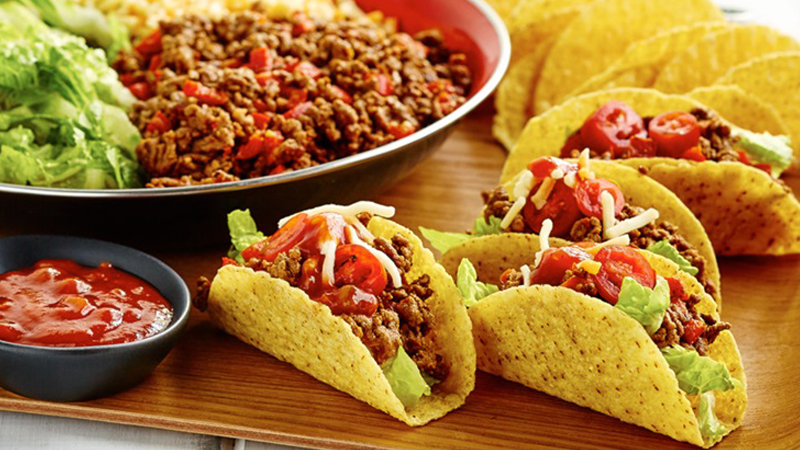Five years ago in the New York Times Magazine, Sam Sifton made the case for hard-shell, middle school tacos.
A year or so ago, in a fit of hunger after a long day of working outside, I pulled in at a Mexican-themed restaurant near my home, and for no other reason than the fact that everyone else was doing so, made like the other mutts sitting at the bar watching sports and sucking down beers: I ordered three-no-make-it-four hard-shell tacos with picadillo, guac and sour cream, yellow cheese and shredded lettuce. I dolloped hot sauce on the sour cream, red rivulets running down the white, and ate, perfectly content. I ordered a fifth and felt proud I had finished it, just as I had in middle school, crushing taco day in the cafeteria.
According to Sifton, while hard-shell tacos are considered to be “as Mexican as a ranch house in the Michigan suburbs,” it remains that millions of Americans grew up in places just like…well, ranch houses in the Michigan suburbs.
So think about long-ago taco dinners spent in the homes of friends, everyone lined up along a kitchen counter while someone’s mom spread bowls of fixings across the Formica for people to graze.
Recently The Economist joined the fray: In praise of mass-market American tacos: authenticity is a terrible metric for judging food. The venerable British newspaper (or is it a magazine?) decried the biases inherent in battles over food and dining authenticity, and suggested these take the fun out of eating.
Chubby, crackly American tacos may be unknown in Culiacán or Toluca, but they taste good. They may well seem “inauthentic” in Mexico, but they are deeply authentic in the minds and memories of millions in America. Korean tacos—tortillas filled with Korean-seasoned barbecued meat and kimchi—are also little known in Mexico. But they emerged authentically from the marriage of Korean and Mexican cultures and cuisines in multicultural Los Angeles.
That is how food develops. Being the original progenitor of a recipe may merit some bragging rights at the dining table, but nothing more. Legend has it that Marco Polo brought noodles back to Italy from China: that does not make spaghetti just bastardised lamian, except in the way that all foods (and people) are hybrid and derivative. Lebanese emigrants brought lamb cooked upright on a rotating spit with them to Mexico. Decades and countless chilies, onions and pineapples later, Mexicans turned shawarma into tacos al pastor.
Conclusions? We have none, except to note that the preparation of this article has me craving tacos – and whatever sort you’re cooking, I’m eating.
Photo credit: Old El Paso.























